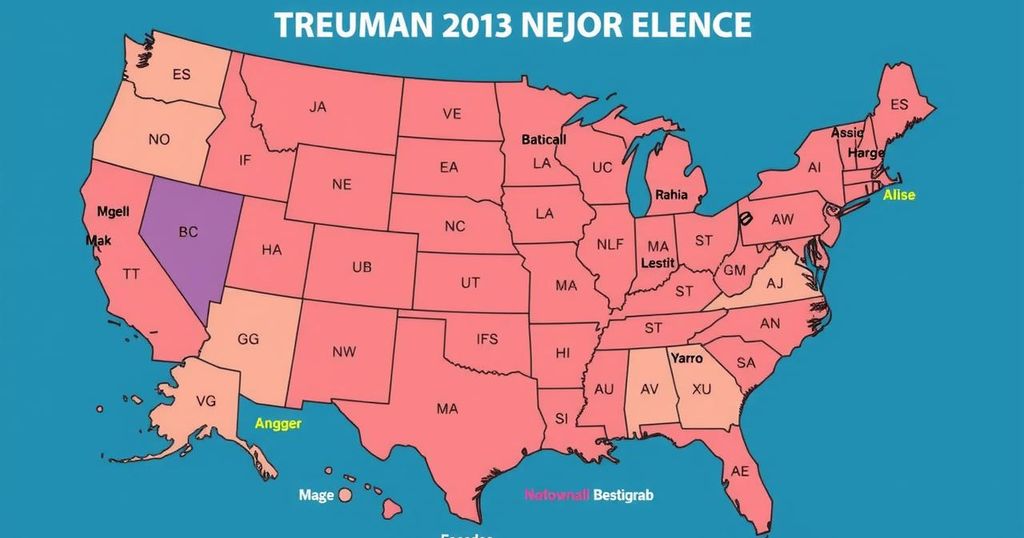2024 Elections: A Landmark Year for Democratic Participation and Governance

The year 2024 witnessed an unprecedented election cycle, with nearly 3 billion people voting across 73 countries. This period marked significant political changes and highlighted challenges including dwindling trust in institutions and the influence of misinformation. The elections showcased notable gains in women’s representation in certain areas, yet systemic barriers to inclusivity, particularly for youth, persist. The 2024 experience underscores both the strengths and vulnerabilities of modern democracies, advocating for ongoing reforms to improve electoral integrity and public engagement.
The year 2024 is recognized as a historic period for elections globally, with approximately 3 billion citizens participating in democratic voting across 73 nations. This unprecedented level of engagement marked it as the largest election year recorded. These elections, covering local and national levels, profoundly impacted political, social, and economic movements worldwide, particularly for first-time voters, thereby illustrating the inclusive essence of democracy.
However, alongside this notable participation, significant challenges emerged. Many citizens expressed feelings of disconnection from decision-making, with two-thirds believing their voices were overlooked within political frameworks. Trust in democratic institutions deteriorated, fueled by disinformation, political divisions, restricted civic spaces, and the exploitation of state resources by current leaders aiming to retain power. The pervasive role of social media and advanced technologies further complicated these concerns, as they facilitated the spread of misinformation and raised alarms about electoral integrity due to concerns such as deepfakes and targeted campaigning.
Dubbed a “super election year,” the events of 2024 revealed profound political transformations, as voters frequently removed incumbents deemed disconnected from the populace’s needs. Far-right movements gained momentum in countries like France and Germany by capitalizing on economic grievances and societal divisions; however, centrist coalitions successfully thwarted these advances. Reports of electoral misconduct, including vote-buying in Serbia and voter suppression tactics in the United Kingdom, further eroded confidence in electoral reliability. Despite these adversities, there were encouraging signs of democratic resilience, particularly in Africa, where younger leaders emerged in nations such as Chad, Mozambique, and Senegal, advocating for more equitable governance. While voter collaboration across political ideologies demonstrated the potential for unity, systemic barriers to gender and youth representation continued to be a matter of concern.
Notably, women’s political representation exhibited both advancements and setbacks in 2024. Mongolia, for example, witnessed a significant rise of seven percentage points in female parliamentary representation, previously driven by the introduction of a gender quota. Conversely, countries like Bhutan and Belarus experienced substantial declines, revealing the uneven progress in women’s political empowerment.
Youth representation, analogous to women’s participation, remained inadequate across many regions globally, with leaders typically older than the average electorate. Although younger heads of state emerged in 2024, the overall demographic trend showed minimal changes in the average age of elected officials. The average age of leadership decreased marginally, with eight individuals under fifty elected; however, Donald Trump’s presidency as the oldest executive elected underscored the age disparity in political representation.
In summary, the challenges faced during the 2024 elections included questions surrounding electoral fairness, trust in institutions, the role of media, and socioeconomic difficulties. Incumbents’ abuse of state resources raised ethical issues, while misinformation and political polarization weakened democratic confidence. Furthermore, there was an evident need for enhanced inclusivity, particularly concerning gender and youth.
The achievements of the 2024 elections highlighted the paradox of progress amidst challenges confronting modern democracies. While disinformation and political strife posed obstacles, they also presented opportunities for reform and the promotion of inclusive governance, aiming to address emerging public demands and pressures for systemic change.
Overall, the 2024 elections represented both an affirmation of democratic engagement and a reminder of the vulnerabilities that persist in the political landscape, emphasizing the importance of continuous efforts towards electoral integrity and equitable representation.
The 2024 elections represent a pivotal moment in contemporary democratic practice, characterized by an unprecedented level of voter engagement. Approximately 3 billion individuals cast their votes, illustrating the capacity for democratic systems to foster significant participation. Despite this positive development, challenges such as disinformation, political polarization, and systemic barriers to inclusion marred the electoral landscape. Key issues include the rise of far-right movements, concerns over electoral integrity, and the widespread perception of disconnect between citizens and their governmental representatives, necessitating ongoing discussions about democracy and its future.
The events of 2024 encapsulated a dual narrative of democratic resilience alongside vulnerabilities. The historic turnout of voters highlighted the efficacy of democratic processes in shaping societal outcomes. However, the challenges posed by misinformation, disinformation, and the erosion of trust in institutions continue to undermine democracy’s responsiveness to citizen needs. This electoral cycle underscores the urgent requirement for reforms aimed at enhancing representation and ensuring that democratic principles are upheld while addressing systemic challenges and fostering inclusivity.
Original Source: anfrel.org







